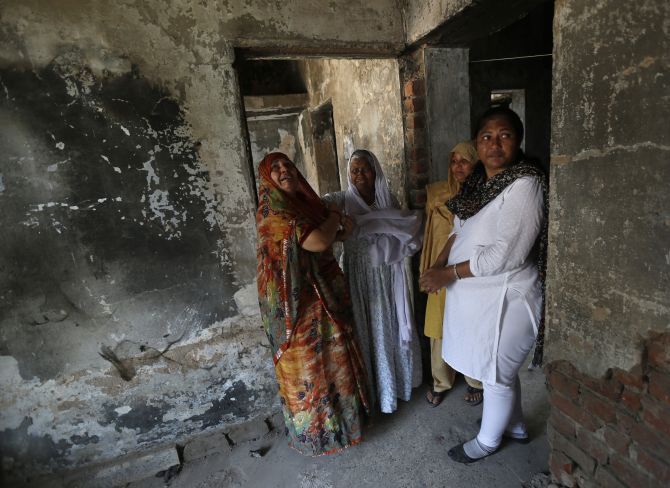
Counsel for the 24 convicted in the 2002 Gulberg Society massacre, which left 69 people including former Congress Member of Parliament Ehsan Jafrey dead, on Thursday sought lenient punishment for those guilty by the court which indicated that it will on Friday decide on the date of pronouncement of the quantum of sentence.
The special Special Investigation Team court is hearing arguments made by the defence on mitigating circumstances and other factors before determining the sentence for the convicts.
On Monday, prosecution had sought death penalty for all the 24 people convicted for the gruesome killings.
Special Judge P B Desai on Thursday heard the lawyer for accused Abhay Bhardwaj, who presented lengthy arguments against demands for capital punishment or life sentence till death, made by the prosecution lawyer.
The judge said the date for pronouncement of quantum of sentence will be decided tomorrow after hearing the SIT lawyer, especially on the aspects of compensation to families of the victims, which has been sought by the victims' lawyer.
The court had on June 2 convicted 24 people and acquitted 36 others, while dropping conspiracy charges. Out of the total 66 accused, six had died during the trial. Of the 24 convicted, 11 have been charged with murder, while 13 others including Vishwa Hindu Parishad leader Atul Vaidya, have been convicted for lesser offences.
While making his submission, Bhardwaj said the court should consider mitigating circumstances for convicts including their prior criminal record, age, socio-economic background, possibility of rehabilitation, and whether they can reform, before pronouncing their sentence.
Citing various judgements of the Supreme Court, he argued that all judgements are on reformative thinking unless prosecution proves that the convicts can't be reformed under any circumstances.
He cited the case of Mohammad Jamaluddin Nasir who was found guilty of killing five policemen and injuring 13 others during attack on American Centre in Kolkata, and whose capital punishment was reduced to life sentence by the Supreme Court.
He also cited the case of Vyas Ram, a member of Ranbir Sena who was found guilty of killing 35 considered to be communist sympathisers in a Bihar village, whose capital punishment was also reduced to life sentence.
"If the state can't establish that the convict is a menace to society, then capital punishment should not be considered...even for those convicted of lesser punishment, leniency and minimum punishment is required. The accused while on bail began normal life by integrating themselves without creating any trouble for even the witnesses even when living in the same locality," he argued.
Bhardwaj also said that sentence of imprisonment for life necessarily means jail term till death with power vested in the state to remit or commute as deemed fit. He also cited the SC judgements where the apex court held that the sentences should be given concurrently and not consecutively.
"When an accused is sentenced for one major offence and found guilty of ancillary provisions, then all sentences would be required to be ordered concurrently and not consecutively," he argued.
Public prosecutor representing the Supreme Court-appointed SIT, R C Kodekar, had on Monday sought nothing less than death sentence or jail term till death for all 24 convicts.
Kodekar had said all 24 convicts were found guilty of offence under section 149 of the Indian Penal Code and therefore required to be treated on par when the sentence is pronounced.
Lawyer for the victim, S M Vora had also sought maximum punishment for the accused and argued that sentencing for each offence should not run concurrently so that they spend their entire life in jail.
The Gulberg Society massacre on February 28, 2002 when Narendra Modi was Gujarat Chief Minister shook the nation when a mob of 400 people set about attacking the society in the heart of Ahmedabad and killed the residents including Jafri.
It was one of the nine cases of the 2002 Gujarat riots probed by the Supreme Court-appointed SIT.
The incident had taken place a day after S-6 coach of Sabarmati Express was burnt near Godhra train station in which 58 'kar sevaks' going to Ayodhya were killed.
The Supreme Court, which has been monitoring the case, had directed the SIT court to give its verdict by May 31. During the course of trial, as many as 338 witnesses were cross-examined, with four different judges having presided over the case.
Of the 66 accused named by the SIT in the case, nine are behind bars, while others are out on bail.










